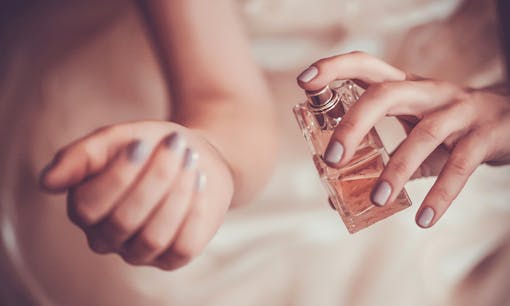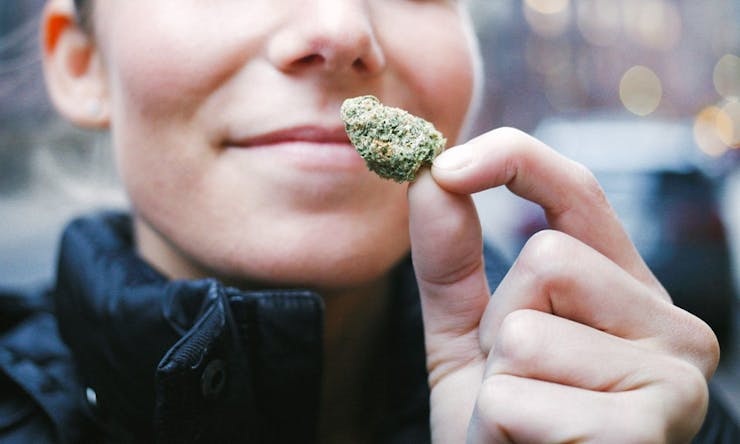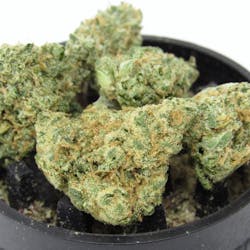To make a truly informed cannabis-buying decision, you have to smell the product. And I don’t mean taking a dainty whiff. You’ve got get in there and really inhale, because smelling it — really focusing on the fragrance — may just be the best way to choose your cannabis.
“Depending on what the scent is, it can make or break a strain for people,” said Tyson Dieter, a manager at the Southwest Portland outlet of Nectar, an Oregon cannabis retailer.
I’m a home perfumer trained by a world-class nose. Years ago I trained at home using natural perfumer Mandy Aftel’s workbooks, and later I studied with her at her studio in Berkeley, Calif. For me scent is the ultimate in pleasure experiences. On a recent Tuesday morning, I stopped in at Nectar to talk scent and learn about the role it plays in the burgeoning cannabis industry.
What Do Cannabis and Perfumes Have in Common?
It turns out perfume and pot have a lot in common.
Both products come with outlandish, sometimes arbitrary titles. Burberry Weekend, meet Blackberry Kush. Practically no one buys the product without smelling it first. (Where it’s allowed, that is. In Washington state, pre-purchase smelling for recreational cannabis is against the law.) We don’t talk about them using the same language, although that’s changing as consumers learn more about scent’s connection to the cannabis experience.

As I stepped through Nectar’s front door, the first thing I noticed was the air, which smelled lightly of sweet herb. The employees — perhaps the happiest service professionals I’ve ever encountered — were all eager to talk to me about their favorite-smelling strains.
Commercial perfumes are composed of top notes, middle notes (also called heart notes) and base notes, so named based on their relative evaporation rates. A perfume with a top note of essential oil of bergamot (citrus) might be paired with a middle note of lavender oil and a base note of thick, resiny oakmoss. Together they make up the full scent experience of the perfume.
In the cannabis world, the language hasn’t yet evolved to describe the plant’s fragrance notes with such specificity. But budtenders and growers are expanding their vocabulary to describe the scent experience. So you may see two main, often contrasting odors: sweet and fruity paired with earthy, like in an Afgooey.
At Nectar the jars open dozens of times a day for olfactory sampling. Some strains are more fragrant than others. A Blackberry Kush may not remind anyone of blackberries, but it does have a subtle sweetness to balance the hashy, diesel-fume center it’s known for. GSC (f.k.a Girl Scout Cookies), another potent strain, smells oily and pungent in the middle and slightly sweet on top.
All cannabis strains carry their own scent signature, a fact that often surprises cannabis consumers who come to a shop for the first time.
“First-timers generally know about THC content and little else,” Dieter said. “But then they usually stand there smelling all day to find a perfect match.”
Some strains share some of their scent identity with the world of aromatherapy. An activating hybrid sativa like Orange Crush has much in common with a bitter orange essential oil — one often used by aromatherapists for energizing. In the same vein, the citrus-scented J1, a sativa hybrid, smells like a traditional fougère-style perfume, opening with a citrus note and moving into an herby heart.
Because scent is deeply personal, no one really agrees on which strains smell best. A savory, cheesy strain like OG99 might send some running for the hills, but for consumers who like to “smoke savory,” the associated mellow vibe is well worth it.
Other consumers prefer the so-called “authentic-smelling” pot strains. For them, something like The Perps, which gives off the odor of a grape Jolly Rancher, might feel like spraying your face with Britney Spears’ Curious.
Why Consumption Methods Matter When It Comes to Scent Preservation
When it comes to harnessing the scent of cannabis, consumption methods matter.
A cannabis flower’s scent comes directly from its terpenes, volatile aromatic organic compounds found in the oils of all flowers. Terpenes in the cannabis flower evolved to attract pollinators or repel enemies. More than 100 possible terpenes are thought to exist in various strains of the cannabis flower.
The unique combination of terpenes in a particular strain produces its aromatic properties and, some believe, is thought to influence the body’s high. To heighten the experience of the terpenes, therefore, consumers should reach for consumption methods involving less combustion. The higher the burn temperature, the more likely the most volatile and aromatic terpenes will combust before being consumed.
In other words, to get the full scent experience, vape it, don’t smoke it.
“When you have a vaping machine, it can hinder the effect of the flavor,” said Myles Hyde, a budtender at Nectar who specializes in medicinal use. For flower, Hyde suggested using a vaporizer in at least the $250 range. “With a lower-quality machine, you may end up smelling some of the machine itself.”
Those who do want to smoke it would be advised to do it indoors, according to Hyde, where the scent lingers, affecting the high.
Other methods, like using hash oil, produces a concentrated scent experience so aromatic it feels like smelling an aged perfume. Dieter pulled a Dogwalker resin with a smell reminiscent of jasmine concentrate: dirty, floral, even slightly fecal. In this way, fragrance obsessives are much like cheese hounds or any other aficionados who move with passion into a sensual pursuit — as they explore their olfactory world, they become more and more enamored with scents that might repel the layperson.
Emphasizing Fragrance as Part of the Purchasing Decision
The importance of scent is beginning to take on a bigger role in the purchasing decision at some of Portland’s leading retail shops. During a recent visit to Oregon’s Finest, a store tucked into the city’s swanky Pearl District, manager Selena Toomey pulled flower-filled apothecary jars off a shelf for me.
“Strains sell themselves based on their scent,” Toomey said. “It makes a huge difference in the experience.”

Perfumers are taught to smell coffee beans between samples in order to cleanse their palates. Oregon’s Finest has adapted the practice for the cannabis connoisseur. Toomey invited me to sniff single-origin beans (this is Portland, after all) while passing between strain jars.
Toomey often suggests patients spend up to 10 minutes working the flower in their hands before smoking or vaping it. Doing so, she said, allows you to smell more of the terpenes and enhance the way it tastes when consumed.
“The terpenoids and flavonoids play a huge part in opening up your receptors to all of the effects of the cannabis,” Toomey explained. “It’s like steaming in a hot shower before you moisturize.”
Scent scientists often talk about the cognitive barriers to talking about our often ignored fifth sense — that we don’t really practice the language needed to really discuss scent.
When Toomey talks about scent to her customers, she sometimes avoids scent talk and focuses on taste, which offers a vocabulary more familiar to most consumers. She’ll speak of a strain like Dutch Treat as being like “mint chocolate chip ice cream.”
Toomey has been at Oregon’s Finest since its 2014 opening. She’s seen her customer base grow from curiosity to connoisseurship, even as the shop retains its focus on pot’s medicinal effects.
She sells individual terpenes as an additive to other marijuana products for medicinal users. Once you have enough experience to identify specific terpenes by smell alone, you can anticipate the associated high, she said.
“If I’m in a dispensary, I can tell by the aroma if a strain will work with my body,” Toomey added. “The nose knows.”
Emily Grosvenor is a writer and perfumer based in Oregon. You can follow her on Twitter.
Image Source: Sara Dilley









